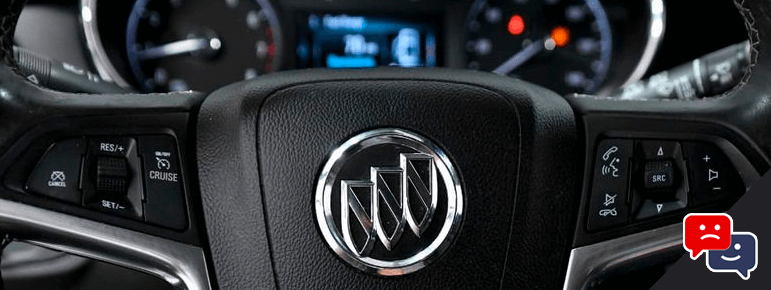Seeing a warning pop up on your instrument cluster can be a worrying sign. What does the Buick check engine light indicate, and how can you address this issue?
The Buick check engine warning light indicates that the onboard diagnostics system has detected an error. Commonly, these issues include a loose or bad gas cap, faulty oxygen sensor, worn spark plugs, failing catalytic converter, or a faulty mass airflow sensor.
These issues vary in complexity, but the important thing to remember is that you shouldn’t ignore this message on your instrument cluster.
If you’re a car owner, chances are you’ll eventually find yourself dealing with the dreaded check engine light. And it doesn’t matter if you drive a Nissan, Buick, GMC, Hyundai, Mazda, or Ford – eventually you see the check engine warning light up.
When driving your Buick, it’s important to pay attention to the check engine light. A steady warning can indicate an issue that needs tending to as soon as possible. As long as the vehicle is working as normal, and isn’t shaking or hear noises, you can continue to drive the car.
However, a blinking warning light signals a more serious mechanical problem. In this case, pull off to a safe spot and stop driving the car immediately. Call the local mechanic or dealership for assistance.
But before you start panicking or shelling out money to have your car serviced, we want to help you troubleshoot and identify potential causes before going any further with repairs.
In this guide, we will take a look at why your check engine light is on in your Buick. This way you will know exactly where to start when diagnosing and addressing the issue.
Common Problems that Cause the Buick Check Engine Light
First, let’s touch on the most common reasons for that pesky check engine light.
A Loose Gas Cap
One problem that can cause the light to appear is if your gas cap isn’t properly put back on your car. In most cars, the gas cap will click into place if it’s correctly installed.
Check for signs of damage in the form of cracks or chips on your gas cap and replace it if necessary.
Oxygen Sensors
Another problem that can cause the error message to occur is faulty oxygen sensors. These measure the amount of airflow entering the engine, sending that data to the Engine Control Module. Data the module uses to ensure the air-fuel ratio is correct.
When the sensors are misreading, the engine may suffer from reduce performance, loss of power, stalling, or misfiring, thereby prompting the check engine light to appear.
Worn Spark Plugs
The spark plugs serve the important role of igniting the combustion chamber, firing off the process of providing torque to the wheels.
When a spark plug is broken, damaged, or worn out, it can trigger the check engine light. Simply identifying and replacing the damaged fuse will fix the problem.
Faulty Sensors
The mass airflow sensors serve the important role of monitoring and regulating the amount of air in the engine.
This data, much like the oxygen sensor, is important to the ECM, and the car’s performance suffers without accurate readings.
Cleaning, repairing or replacing the sensor will fix the issue.
Any one of the above problems could cause the check engine light to illuminate. It could be a minor issue, such as a loose or faulty gas cap.
The way the check engine light behaves can be an indicator of how serious the problem really is.
For example, a steady light usually suggests a less serious issue. However, a flashing or blinking check engine light indicates that your engine is in critical trouble and requires immediate service. We’ll touch on this next.
Why is my Buick Check Engine Light Blinking?
Seeing a blinking check engine light on your Buick dashboard means your vehicle needs immediate attention. It’s recommended that you get to a safe spot and turn the car off and call for help.
Fact is, a blinking Buick engine warning light typically means a severe engine misfire. A misfire allows unburned fuel to be dumped into the exhaust system, eventually damaging your catalytic converters.
Is it Safe to Drive With My Buick Check Engine Light On?
It depends, but generally it’s not recommended you drive your Buick with a check engine light is on.
While in some circumstances, the check engine light may illuminate due to minor issues, such as a loose gas cap or faulty sensor. In this case, the check engine light will be a solid or steady illumination. With that said, it’s generally okay to drive the car before getting the car looked at by a mechanic.
Other times it can be an indication of a more serious issue, such as engine misfires or transmission problems. Typically when the problem is more serious, the check engine light will blink or flash.
Continuing to drive your Buick with a blinking or flashing check engine light on can potentially cause further damage to your vehicle and result in costly repairs.
Additionally, if you live in an area with emissions testing requirements, a lit check engine light will typically result in an automatic failure of the test.
In general, when you see a check engine light – it’s best to have your Buick diagnosed by a qualified mechanic as soon as the check engine light comes.
How Much Does it Cost to Have My Buick Check Engine Light Diagnosed?
Truth is, the cost to diagnose a Buick check engine light can vary depending on several factors. Factors such as dealership’s pricing, location, and the severity of the issue.
With that said, expect to pay an average of $100 to $150 for a diagnostic check at a Buick dealership, or $50 to $100 for an independent mechanic.
However, keep in mind that the cost of repairs, if needed, is not included in the diagnostic fee.
If you’re concerned about the cost, consider taking your Buick to an independent mechanic who specializes in Buick vehicles.
Because they may be able to diagnose and fix the issue at a much lower cost than a dealership. However, they may not be able to provide a warranty for the work performed. So just keep that in mind.
Final Thoughts: Buick Check Engine Light
There are a number of problems that can arise in a system as complex as the engine, and the appearance of the light is a forewarning that there’s something you need to address.
Truth is, it’s important to understand what your car is trying to tell you so that you can quickly address any issues. Pay close attention to the check engine light on your Buick. If it’s a solid, steady light, most likely its not an emergency. However, if the light is blinking, stop driving the car as soon as possible.
It’s always worth taking the time – not just for peace of mind but also for financial savings as well, to check for any issues indicated by the warning lights on your dashboard. Doing this right away will save you not only money but also any unnecessary headaches down the road.

Managing Editor
Christopher is an automotive technical writer. When he’s not at the local autocross event, he can often be found working on one of his cars. Specializes in automotive class action law, industry trends, and automotive maintenance. Email me direct, or learn more about us

